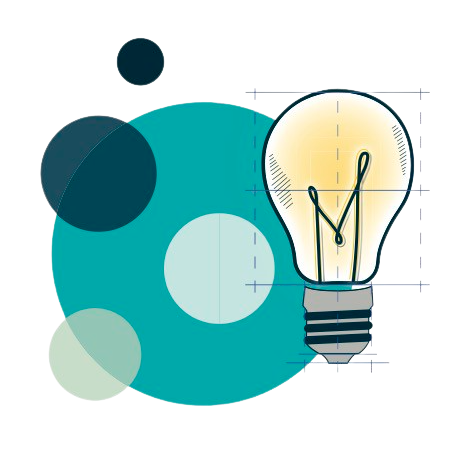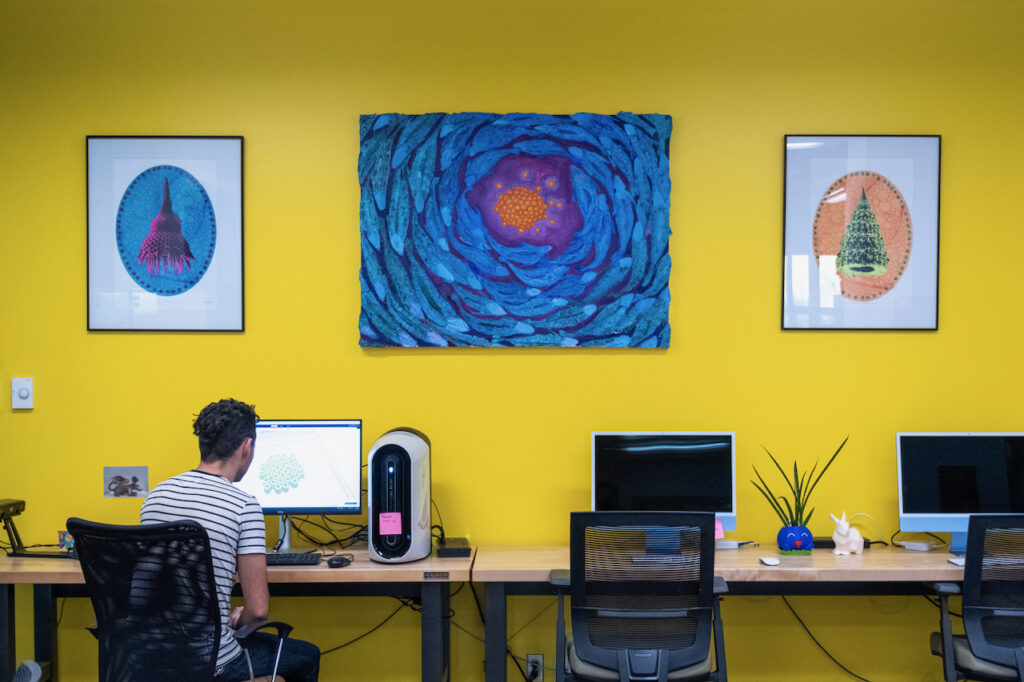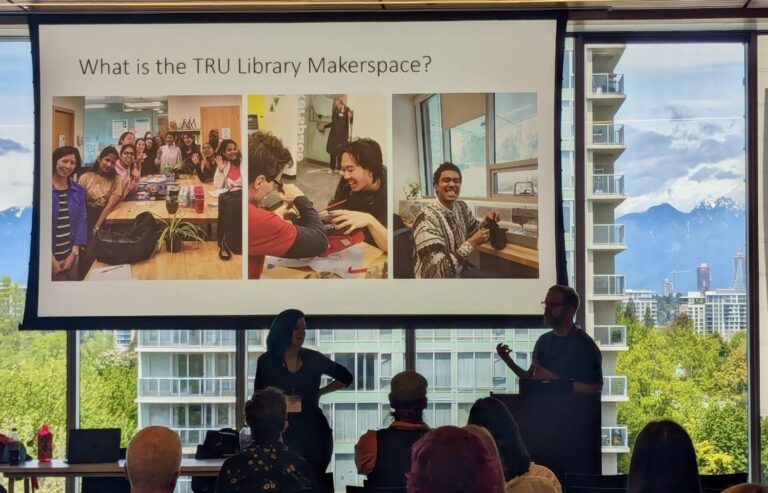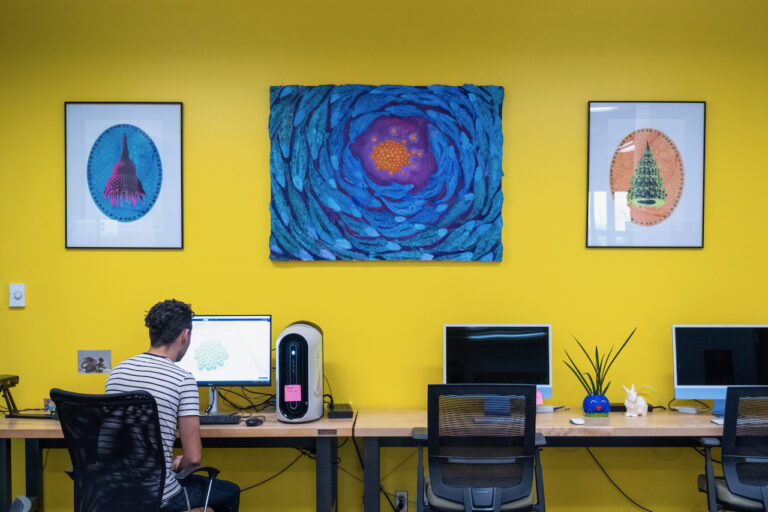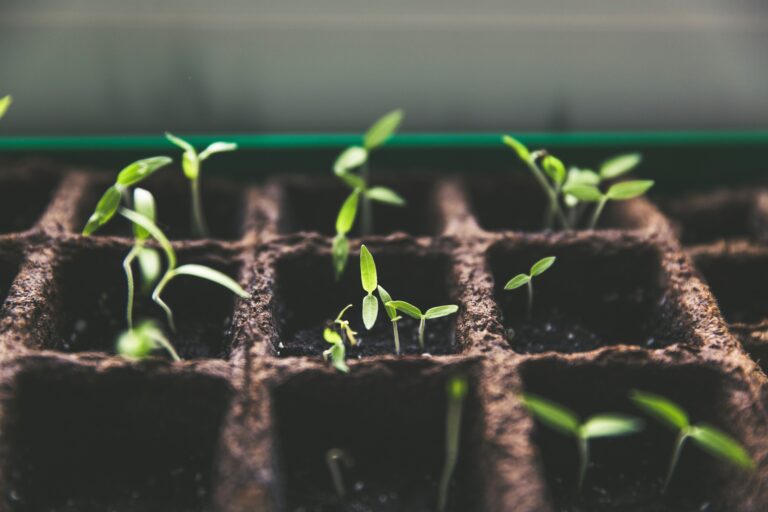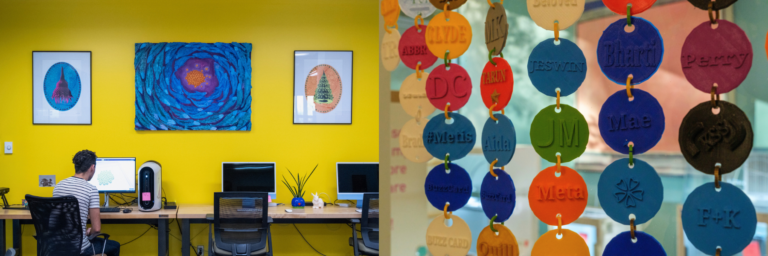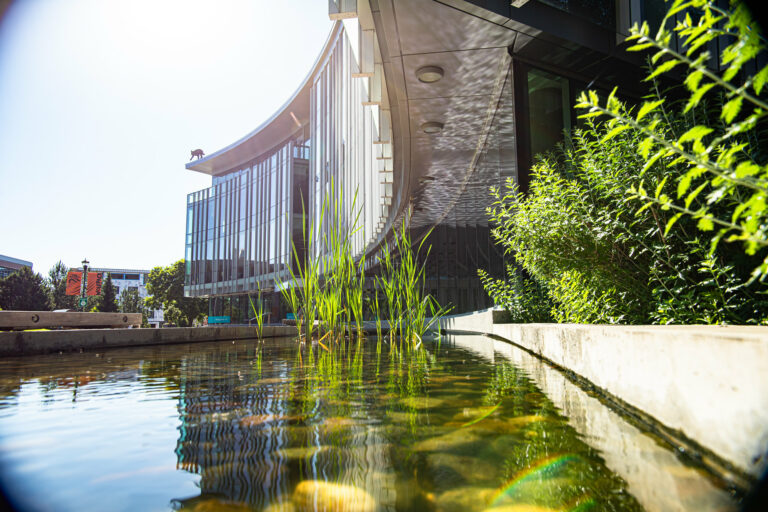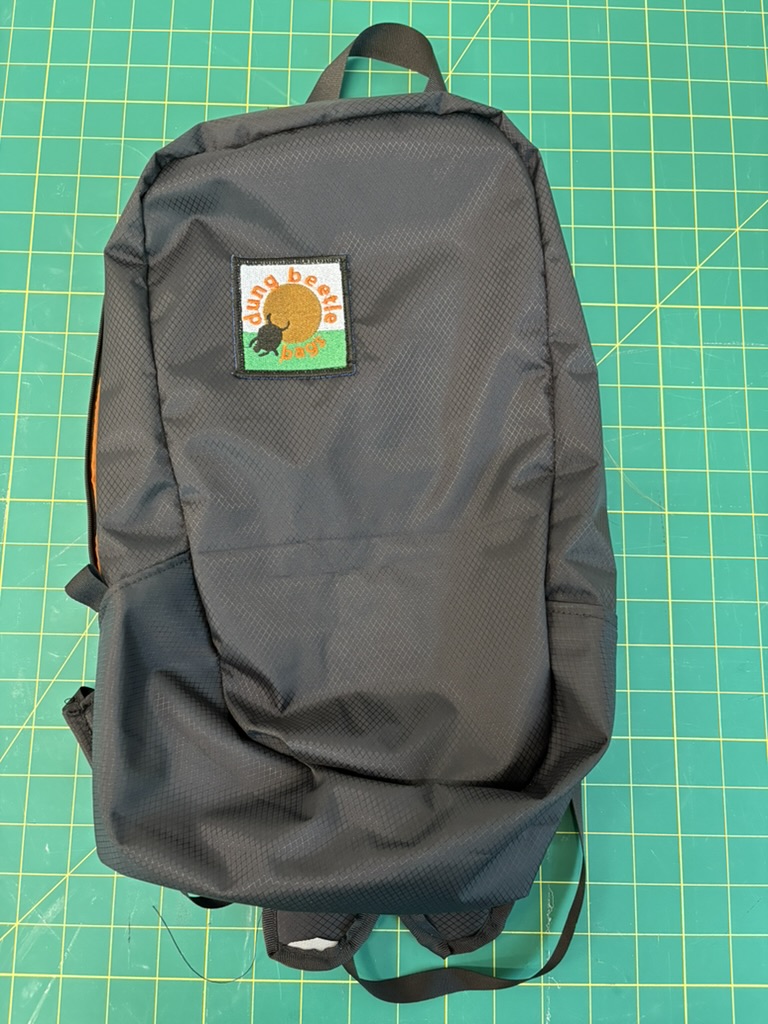Summer and Fall 2023 Makerspace Librarian’s Report
The summer and fall semester went by so fast! A lot has happened since my last report in May, 2023, which can be viewed here: Winter 2023 TRU Library Makerspace Librarian’s Report – TRU Library Makerspace (C7elelkstén’). Let’s get right into it!
Overview
We spent the summer on team building and storytelling. We created a Team Charter that outlines our shared values and how we work together to make those values real. This charter reflects years of working closely together and multiple meetings to talk about individual and group values and how we make those real. I’ll be posting about more about our Charter soon, but in the meantime, here are some cheesy posters I made for each of our team values.
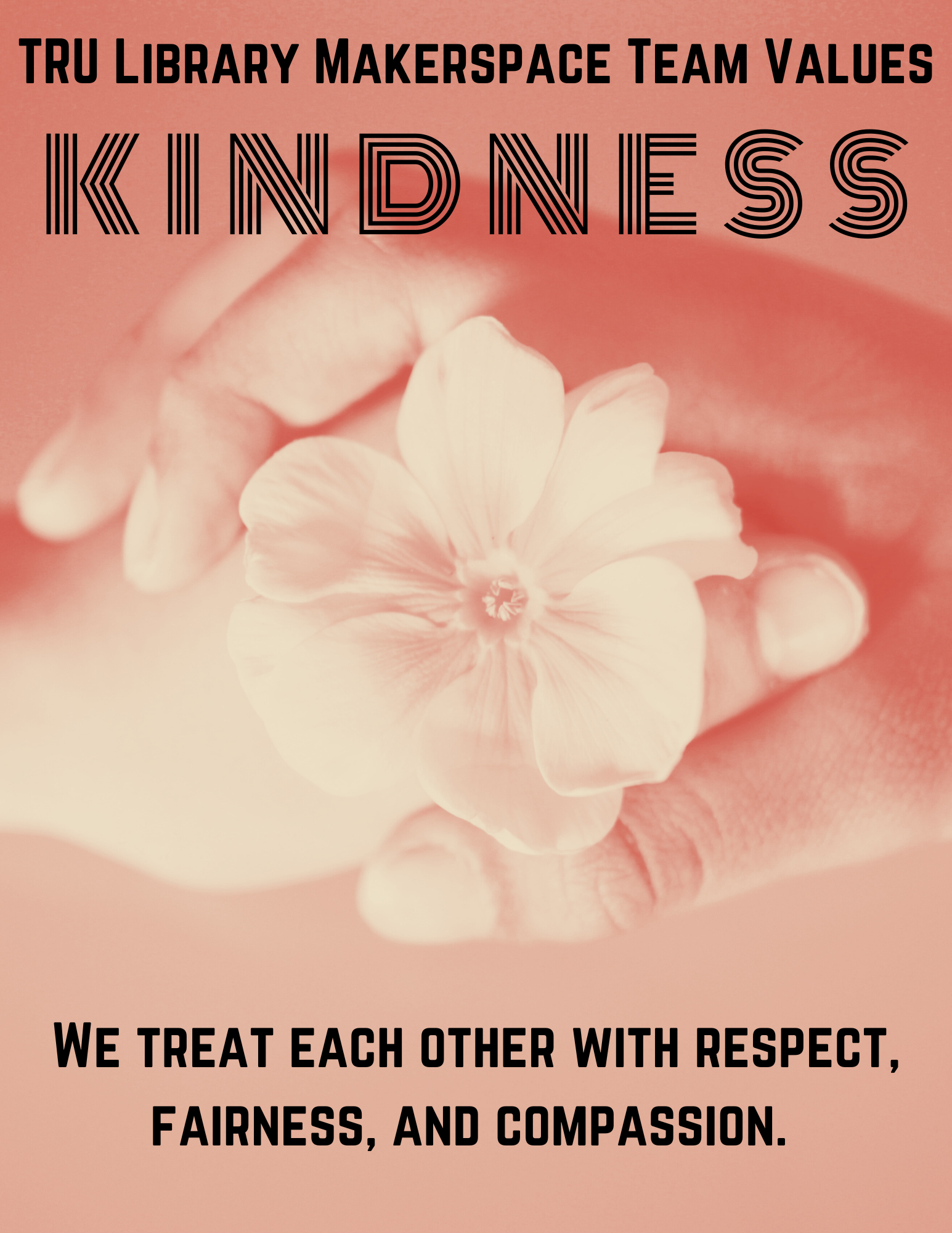
Kindness: We treat each other with respect, fairness, and compassion. 
Growth: We prioritize learning and doing new things. We value creativity, change, and 
Community: We have mutual responsibilities to each other and our community. We can 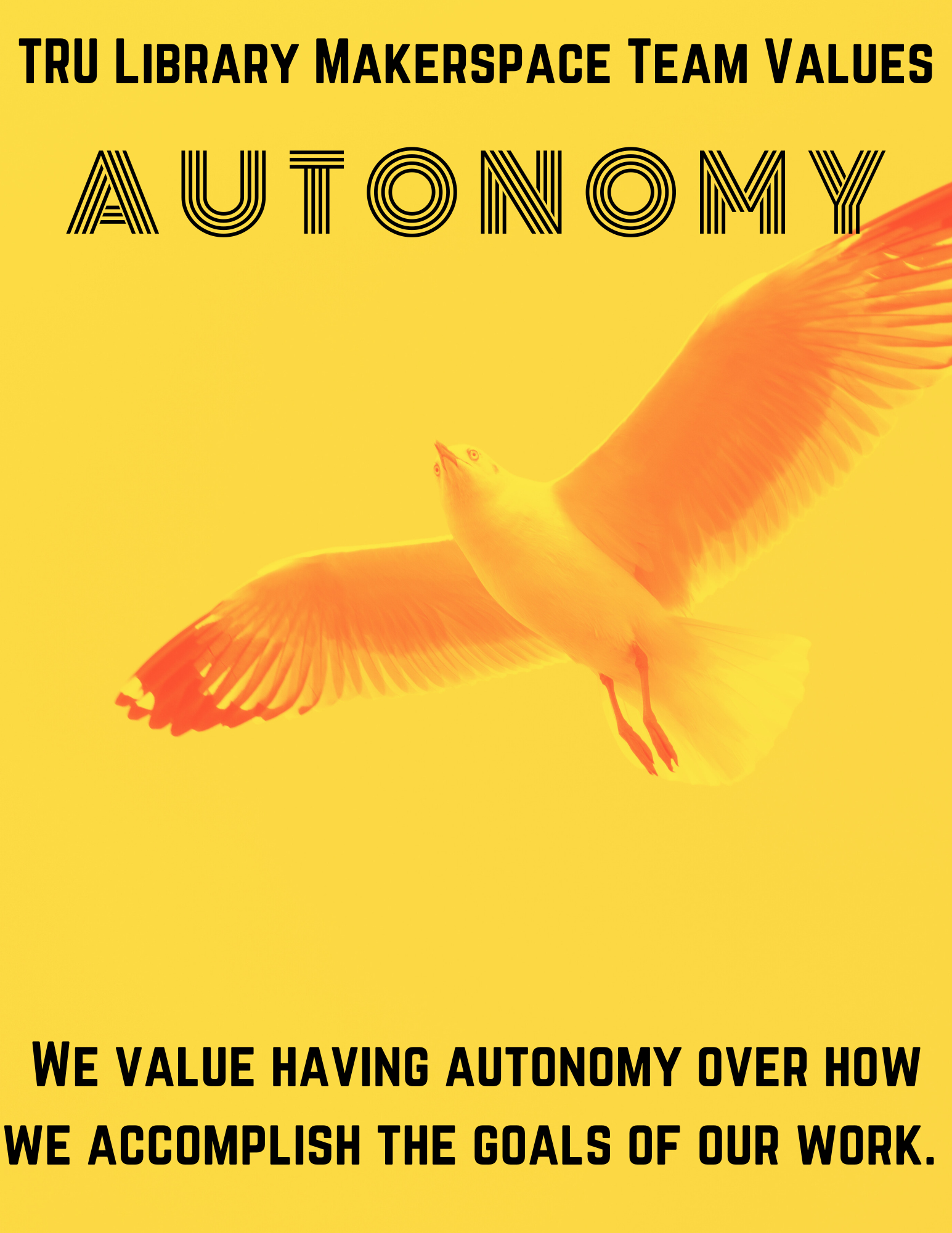
Autonomy: We value having autonomy over how we accomplish the goals of our work. 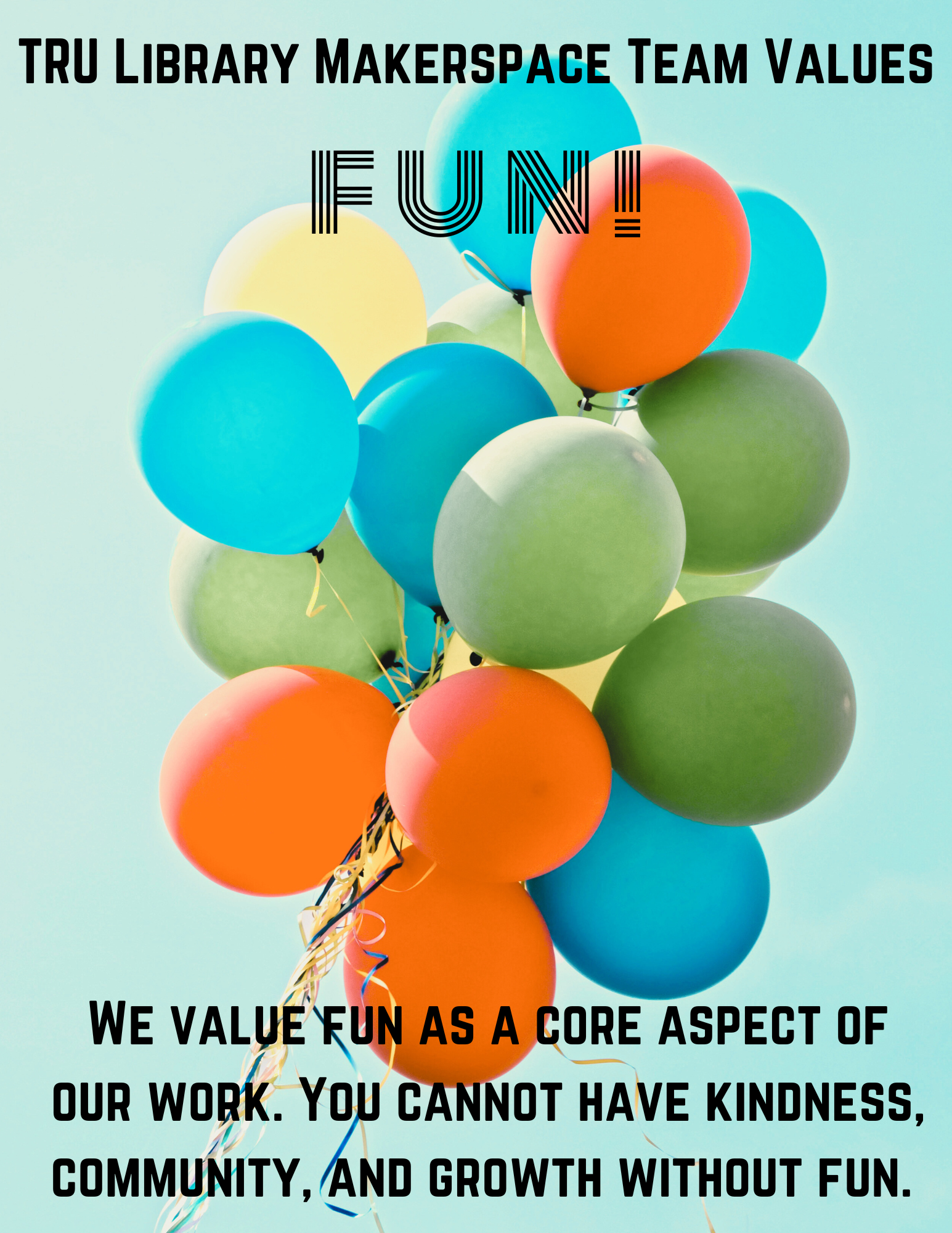
Fun: We value fun as a core aspect of our work and the philosophy/pedagogy of the Makerspace. You cannot have kindness, community, and growth without fun.
We also spent some time capturing stories about our users and trying to understand the common themes that have emerged since we opened. As the faculty member who oversees the space, I’ve learned that the real value of what happens in Makerspace isn’t the objects people make, it’s the confidence they develop in their ability to learn new skills, the feeling of belonging they develop, and other outcomes that need to be embedded in a story to explain.
But stories aren’t just a better way to talk about what happens in Makerspace, they’re a better way of guiding users towards making the most of their time in Makerspace. Thinking of what we do in Makerspace as storytelling-with-an-object instead of making an object encourages users to take bigger risks and encourages thinking about context, community, and impact.
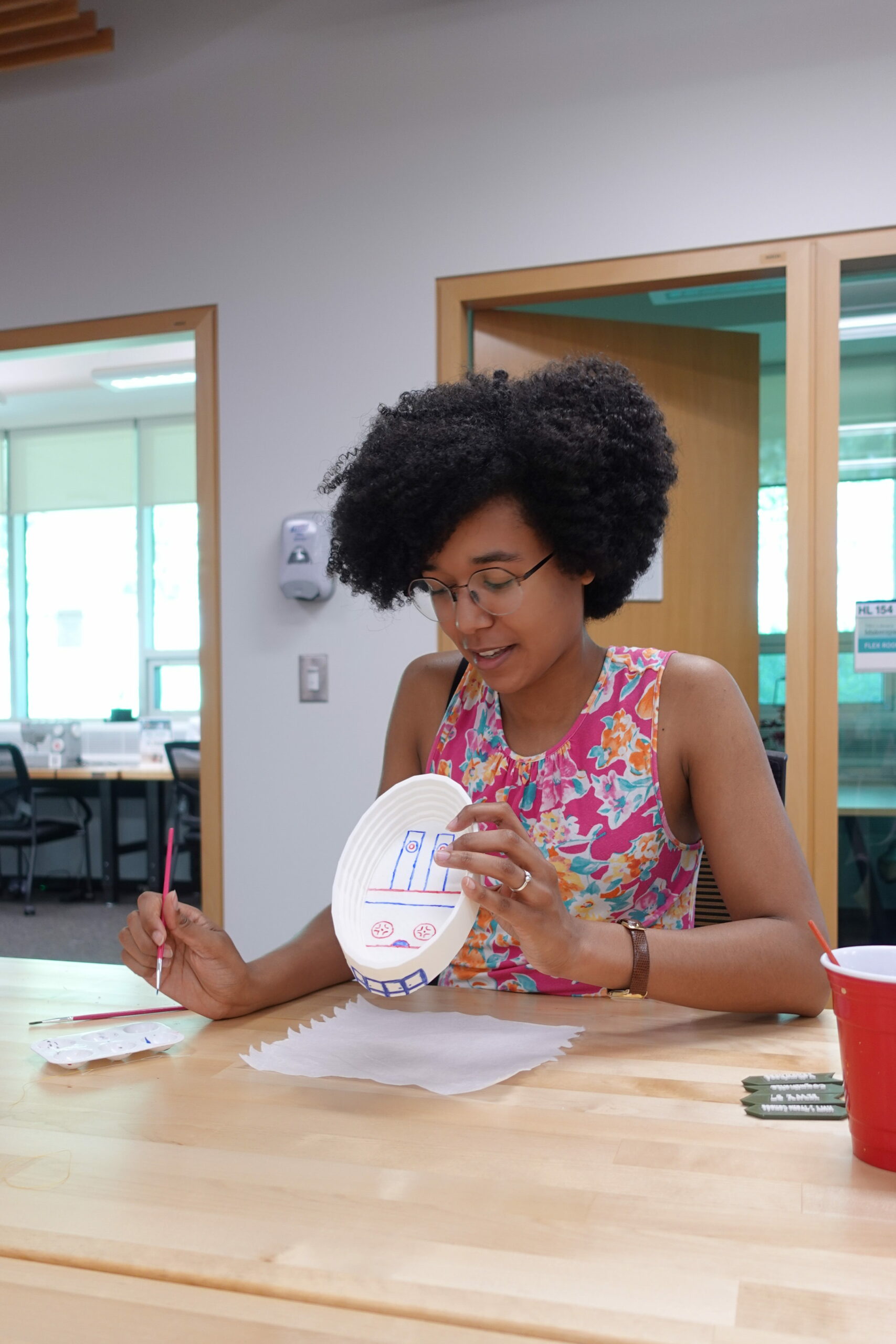
This focus on storytelling has changed how I introduce the space and work with faculty to bring classes and assignments into the space. Increasingly, I want to frame Makerspace projects as storytelling projects. I’ve tried to capture some of my thinking here:
Storytelling should be the primary frame for (more than just) makerspace outcomes – Wilding the Makerspace.
This semester we’ve been focusing on managing growth and building on our strengths. Increasingly, I’m looking for where we can best have an impact by focusing on what we are good at. We’ve also been focusing on broader values, especially around sustainability and decolonization. A small example of this is that at the end of tours and classes I now usually leave students with 3 challenges that relate to our values, sustainability, and decolonization. Some more info about this can be found here: Three Challenges for Makerspace Users – Wilding the Makerspace.
New Staff and Student Makerspace Ambassadors
This fall we welcomed a new Library Technician, Dayun, who has been doing a great job covering the Monday afternoon shift and filling in for other staff when needed. Welcome Dayun! We also welcomed two new Student Makerspace Ambassadors, Adrian Romeo and Cassidy Jean! Adrian and Cassidy join returning Makerspace Ambassadors Tarun, Geordie, and Deeparsh. It’s hard to imagine the Makerspace without our wonderful Student Ambassadors.
 Dayun joined the TRU library team in the fall of 2023, and she is excited to be a part of the Makerspace team. She enjoys learning new technologies and sharing with others while working. When she is not at work, she spends most of her time with her dog.
Dayun joined the TRU library team in the fall of 2023, and she is excited to be a part of the Makerspace team. She enjoys learning new technologies and sharing with others while working. When she is not at work, she spends most of her time with her dog.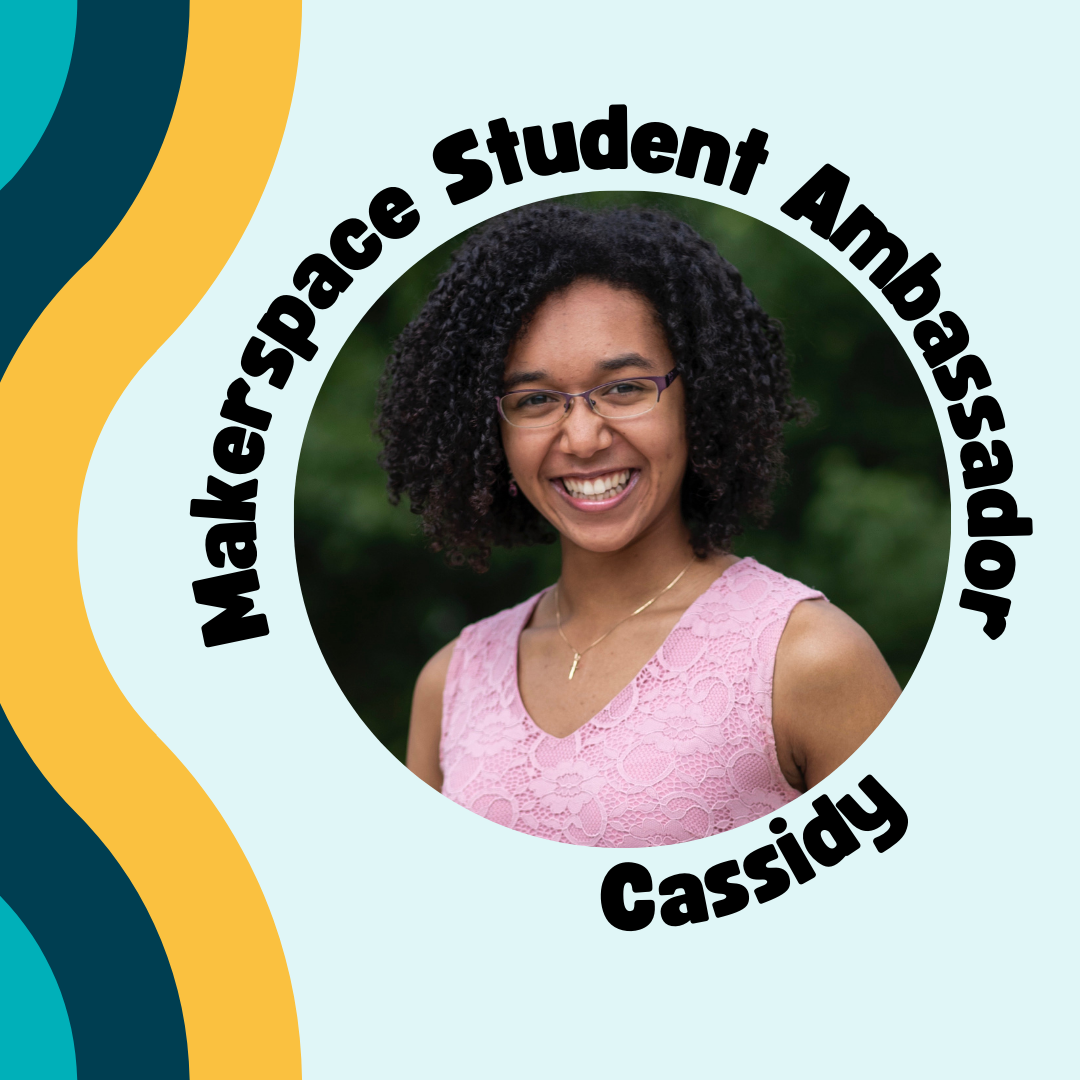 Cassidy joined the Makerspace Ambassadors after she spent an entire summer monopolizing the 3D printers. She is currently working on her TESOL certificate, which will allow her to teach English all over the world. She’s looking forward to learning about the different technologies at the Makerspace, although she’s pretty sure she’s (finally) got the hang of the 3D printers. She’s hoping to do some sewing this year, and maybe make some music.
Cassidy joined the Makerspace Ambassadors after she spent an entire summer monopolizing the 3D printers. She is currently working on her TESOL certificate, which will allow her to teach English all over the world. She’s looking forward to learning about the different technologies at the Makerspace, although she’s pretty sure she’s (finally) got the hang of the 3D printers. She’s hoping to do some sewing this year, and maybe make some music. Adrian Romeo is a Makerspace student ambassador and a fourth year Visual Arts student at TRU. Adrian grew up in Clearwater B.C., a small town famous for being an entry way to The Wells Gray Provincial Park. Adrian’s favourite technology is the new Abode Substance Modeler software on the Makerspace desktops. As a visual artist who is used to working with her hands this software feels very accessible and intuitive. Adrian is currently working on designing a figurative sculpture using Adobe Substance Modeler to then 3D print a miniature of and to place in a photo imagine of a real location. Adrian has failed at many projects, most projects in fact! She believes one of the best ways to learn is to do, and that often means making mistakes when you’re new to a technology or technique. That’s a big part of art and a big part of learning.
Adrian Romeo is a Makerspace student ambassador and a fourth year Visual Arts student at TRU. Adrian grew up in Clearwater B.C., a small town famous for being an entry way to The Wells Gray Provincial Park. Adrian’s favourite technology is the new Abode Substance Modeler software on the Makerspace desktops. As a visual artist who is used to working with her hands this software feels very accessible and intuitive. Adrian is currently working on designing a figurative sculpture using Adobe Substance Modeler to then 3D print a miniature of and to place in a photo imagine of a real location. Adrian has failed at many projects, most projects in fact! She believes one of the best ways to learn is to do, and that often means making mistakes when you’re new to a technology or technique. That’s a big part of art and a big part of learning.
Sustainability Grant
Building Capacity for Social and Environmental Sustainability
In the spring I hired two student Student Sustainability Champions to support the work of our Makerspace Sustainability Incubator funded by TRU Sustainability Grant Fund. Cicyetkwu Bennett-Dunstan brings experience as the Transitions Coordinator for Indigenous Education and Melissa Kelm brings experience working as an Indigenous Mentor for Cplul’kw’ten. They have been helping me build relationships across campus with groups related to environmental or social sustainability. We’ve already run a welcome event for Indigenous students, a meeting with staff and faculty from Indigenous Education and FSD, and an Open House co-sponsored by TRUSU to bring together student groups focused on similar issues to talk about how they can use Makerspace to advance their work.
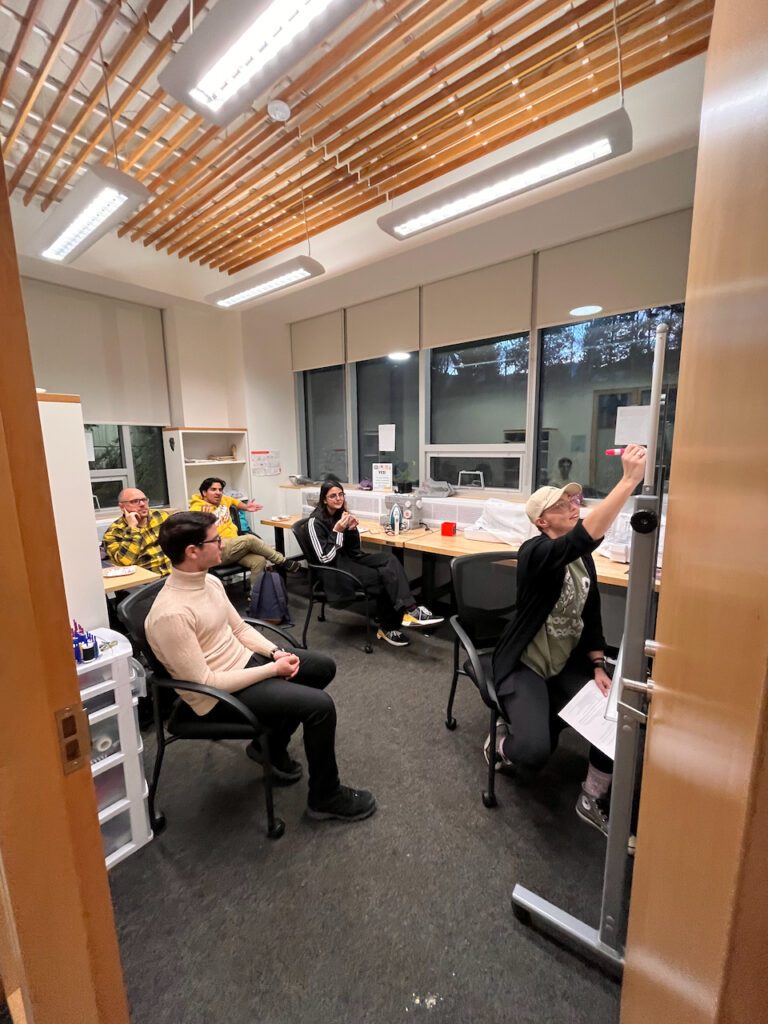 TRUSU Student Club Leaders taking part in an Open House
TRUSU Student Club Leaders taking part in an Open House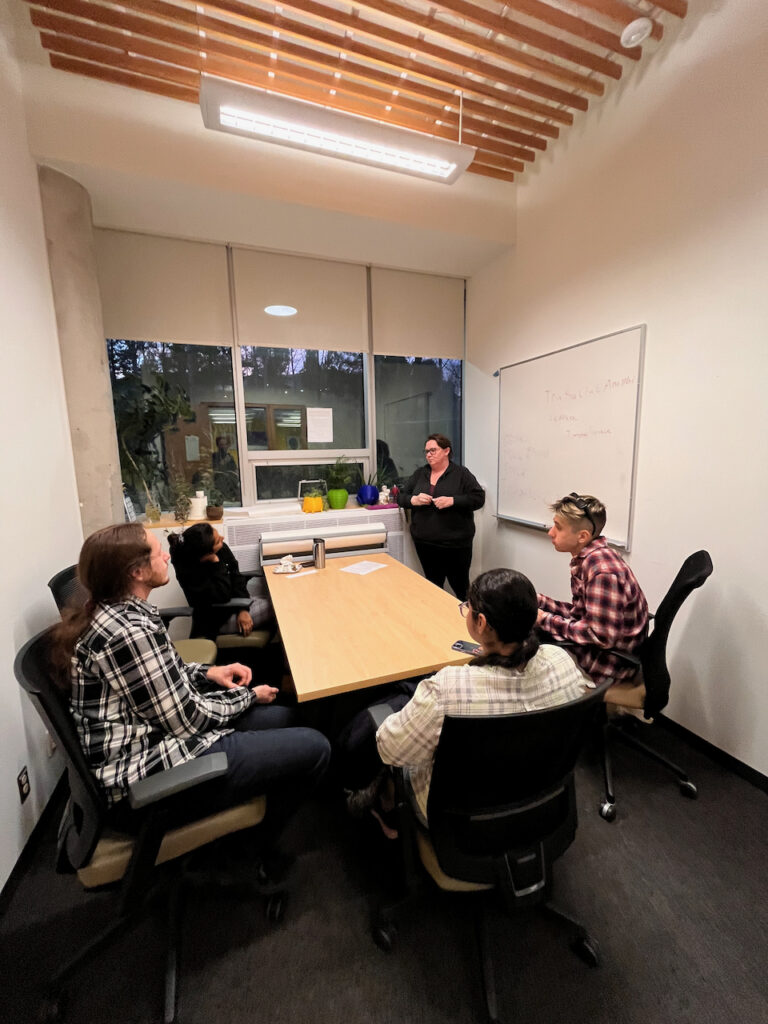 TRUSU Student Club Leaders taking part in an Open House
TRUSU Student Club Leaders taking part in an Open House TRUSU Student Club Leaders taking part in an Open House
TRUSU Student Club Leaders taking part in an Open House
We also hosted another Repair Event with the wonderful Kamloops Repair Cafe folks, this time organized by three students as part of a class assignment. We are looking forward to having more of these in the spring and making them happen a few times a year in collaboration with student clubs and the TRU Sustainability Office.
Tool Library

Our Tool Library is quickly coming together! Valentine has been using their extensive experience working in a tool crib in Alberta and their excellent research skills to help me find and select tools, Olivia has been handling purchasing and working with our cataloging colleagues to get everything ready to lend out. In January we will officially launch and start offering household, garden, bike, and even some car tools for people who want to fix, repair, or maintain things or who don’t own tools themselves.
Fiber Bank
The Fiber bank, which will be a donation-based supply of textile materials such as fabric and wool that students will be able to access for free, is on hold until the new year and we’ve finished with the Tool Library.
New Art in Makerspace
We were lucky enough to be able to add 4 pieces of art to Makerspace from TRU’s permanent collection of art made by TRU students and faculty members. We are working on getting labels for each piece.
Updating our 3D Printing Guidelines, Code of Conduct, Program Description, and Website
We’ve learned a lot since we opened almost 2 years ago about how to support self-directed experiential learning and advance our values of equitable access, playful experimentation, collaboration, and sustainability.
Given that, it is time that we update some of our guidelines and other materials.
We’ve already updated our 3D printing guidelines to increase access, encourage creativity and design, and reduce waste. These new guidelines are on our website and a blog post about them is here: New 3D Printing Rules and Guidelines – TRU Library Makerspace (C7elelkstén’).
We are in the process of updating our Code of Conduct and creating a formal Program Description that describes our pedagogy and values. The Code of Conduct and the Program Description will be reviewed by the Makerspace Operations Team, then the Librarians’ Department, and finally will go to our faculty council for a discussion and vote sometime in spring of 2024.
I’ve been working with Sarah and Olivia to update our website around the way users access Makerspace and to remove out of date and unnecessary content. Sarah and Olivia have done a tremendous amount to learn WordPress and recommend changes based on their extensive experience working with the technologies and users. Changes are happening every day and hopefully we will be done early in the new year.
We also started putting up our 3D printed tokens made by users. We have well over 100 already just from this summer and semester. Whenever people come to learn to 3D print on our space, they will add to this display of our community.
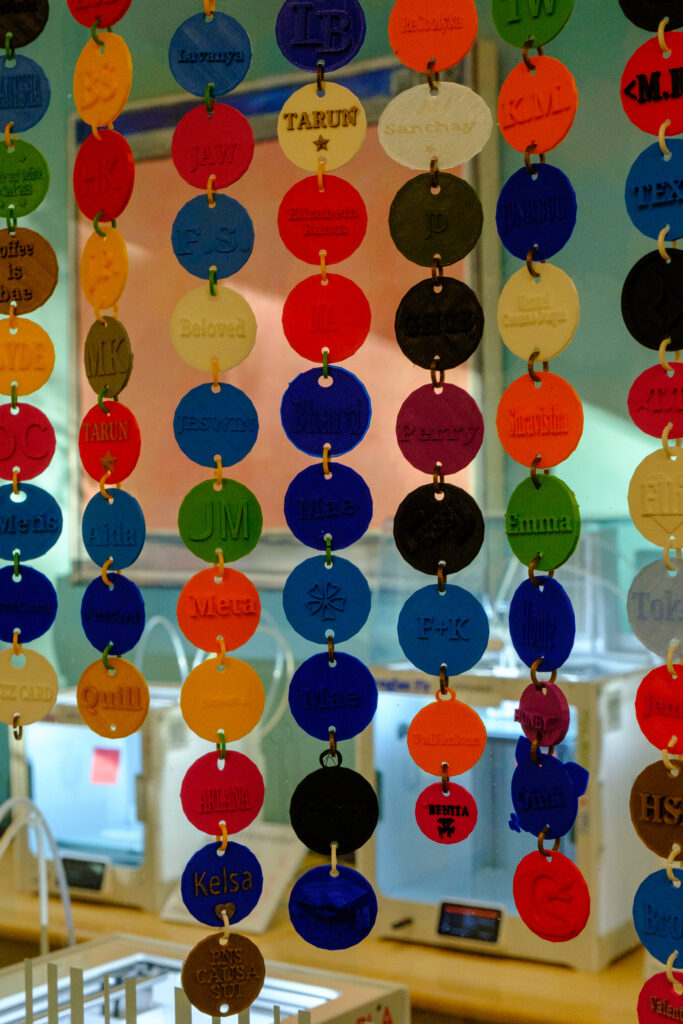
Makerspace Assessment Research Update
Our team (Olivia, Amy, Sarah, Valentine, and myself) have been finalizing the Makerspace Assessment Research Project we started last year. All the interviews have been transcribed and coded and we are starting to look at the results. Amy (our Assessment Librarian) and I would like to get this done and submitted for publication by the end of next term!
Events, Classes, Workshops
Events (Number of attendees in parenthesis)
- Bannock and Beat Saber Event for Cplul’kw’ten (12)
- Future Student Ambassadors
- Library Staff Costume Making
- Indigenous Education and Indigenous FSD Staff (14)
- TRUSU and Makerspace Open House for Clubs (25)
- Law Department Ornament Making (UPCOMING)
Classes (Number of attendees in parenthesis)
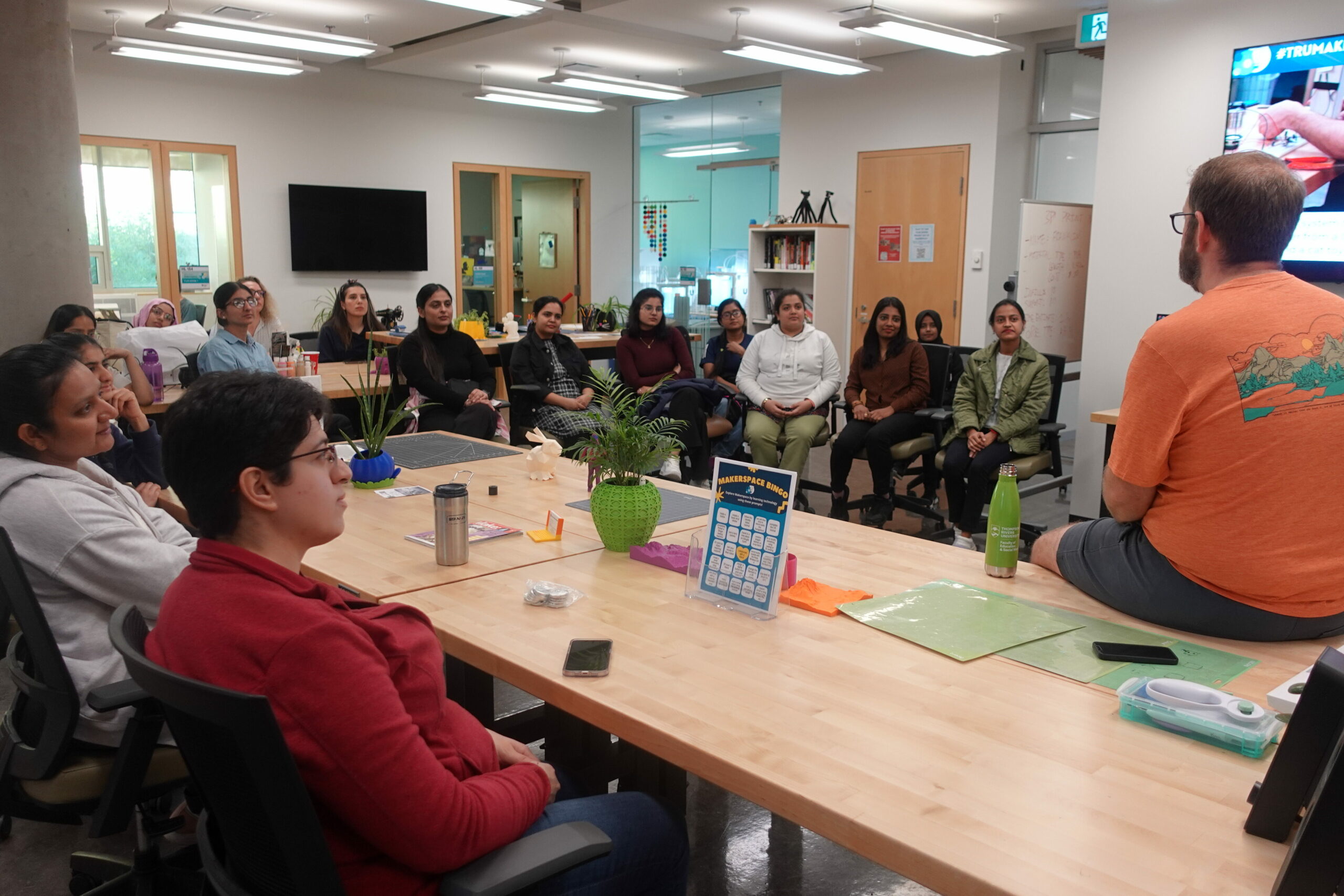
- VISA Sculpture 1 (6)
- VISA Sculpture 3 (19)
- Engineering 1100 (39 over 2 sessions)
- VISA 3D Foundations (20)
- EDUC 5030 (25)
- EDUC 5030 (20)
- Business and Innovation (21)
- EDUC 5030 (18)
- VISA Sculpture 1 (7)
- Adventure Studies (26)
- Master of Human Rights and Social Justice HRFJ 5120 (13)
- CMNS 2160: Mass Communication and the Pop Culture Industry (30)
Workshops (Number of attendees in parenthesis)
- Introduction to 3D Printing (3 workshops, 17 participants total)
- Moccasin Making Workshop with Indigenous Education Cultural Coordinator (15)
- Moccasin Making Workshop with Indigenous Education Cultural Coordinator (10)
Statistics
More statistics can be viewed on our about page:
Gate Count
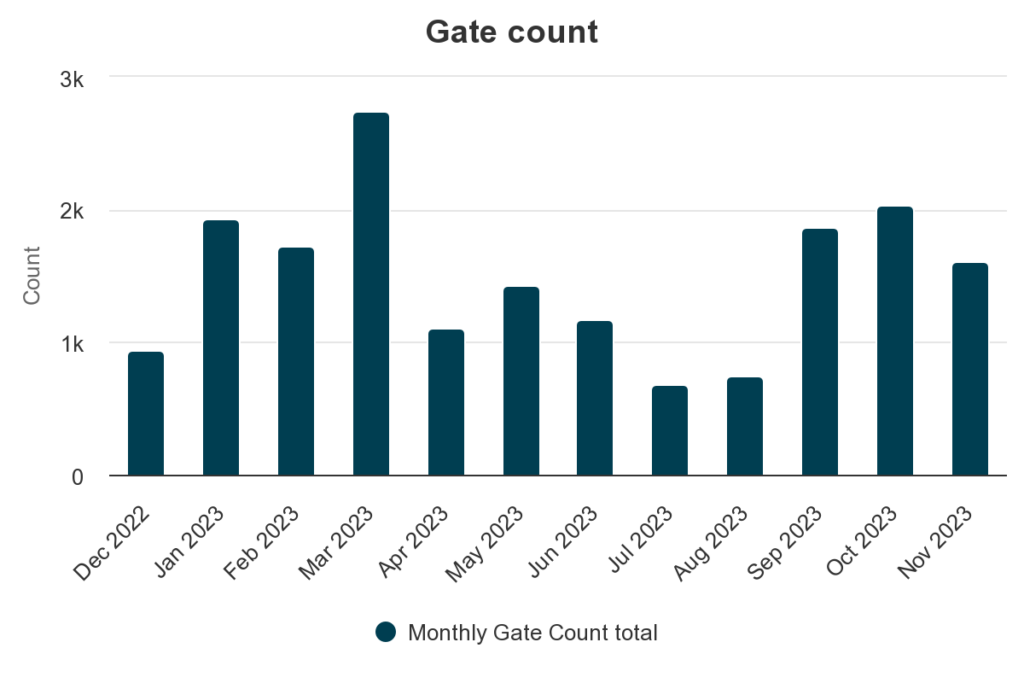
Reference Interactions
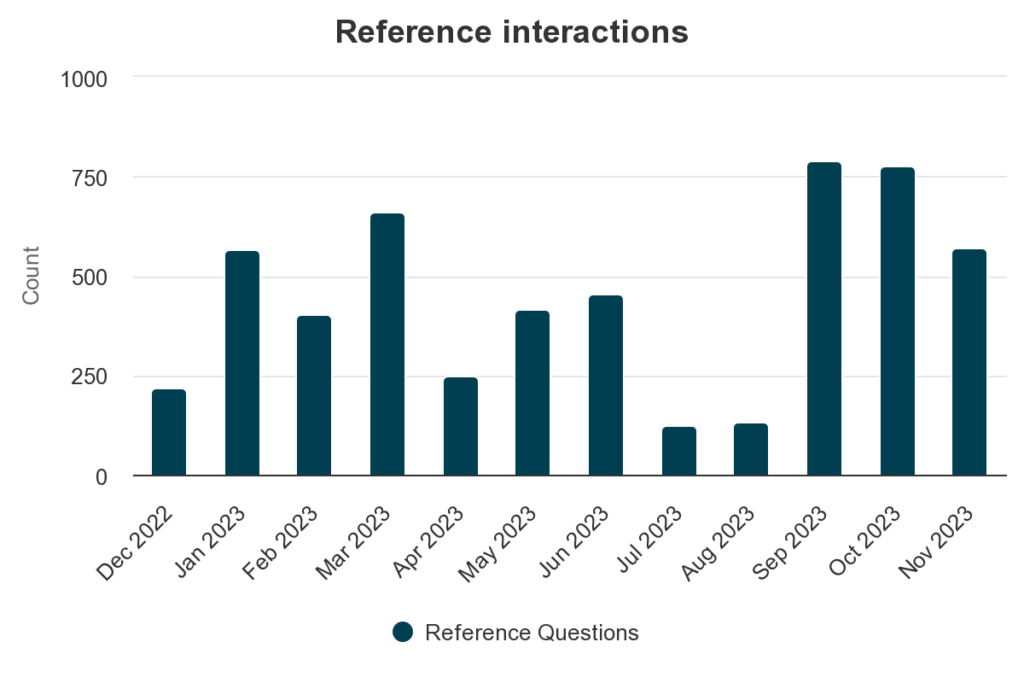
Reference Interactions by Technology

